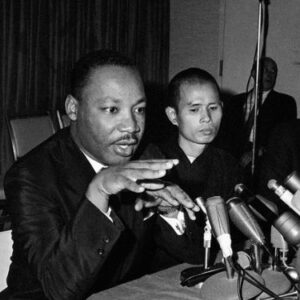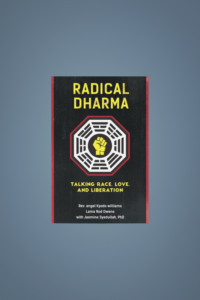Dear Friends,
I hope this issue of the Ripple Effect finds you and those you love doing well.
February is Black History Month – a time to honor the culture, experiences, and achievements of Black Americans. Awaken Pittsburgh encourages the ongoing recognition of the role of past and present members of the Black community in promoting mindfulness; meditation; and our core values such as equity and compassion. While reflecting on their efforts and achievements during this month is crucial, it is also necessary to celebrate their contributions year-round. We all must strive to celebrate the Black community regularly and to integrate their history into our collective history. In doing so, we all take responsibility for moving the needle toward a more just and empathetic society.
When reflecting on this piece, so many people that I hold near and dear to me as supporters of my path of practice, or just my life in general, came to mind. And I send out appreciation for them all! I’d like to share a bit about some of the people that have had a huge influence on my personal path of practice and supported me in learning how to integrate mindfulness into my work for social justice and equity. I will start with two historical figures who have both passed (it is Black HISTORY month after all) and move on to talk about some people who are living history in the making, inspiring change and working tirelessly for social justice through love and practice.
 One of the most influential people in our country in the last century was Martin Luther King, Jr. “ MLK,” a towering figure in the American civil rights movement, was such an inspiration to me (and our country) in so many ways, but particularly his commitment to nonviolence and his deep contemplative practices. He is a prime example of living one’s spiritual convictions. It has also been an inspiration to me to know that Martin Luther King Jr. and Zen master Thich Nhat Hanh, a revered Vietnamese Buddhist monk and peace activist, had a significant relationship centered around their shared commitment to peace, justice, and civil rights. Both of these amazing men have influenced my life, thinking and commitment to doing good work in the world. They both got into some “good trouble” in their lifetimes.
One of the most influential people in our country in the last century was Martin Luther King, Jr. “ MLK,” a towering figure in the American civil rights movement, was such an inspiration to me (and our country) in so many ways, but particularly his commitment to nonviolence and his deep contemplative practices. He is a prime example of living one’s spiritual convictions. It has also been an inspiration to me to know that Martin Luther King Jr. and Zen master Thich Nhat Hanh, a revered Vietnamese Buddhist monk and peace activist, had a significant relationship centered around their shared commitment to peace, justice, and civil rights. Both of these amazing men have influenced my life, thinking and commitment to doing good work in the world. They both got into some “good trouble” in their lifetimes.
Thich Nhat Hanh shared, "The moment I met Martin Luther King, Jr., I knew I was in the presence of a holy person. Not just his good work, but his very being was a source of great inspiration for me…In Vietnam, we refer to Dr. King as a 'Bodhisattva', an enlightened being devoted to serving humanity."
During the turbulent times of the Vietnam War era, Thich Nhat Hanh's unwavering advocacy for peace caught the attention MLK. Soon after meeting Thich Nhat Hanh, MLK himself became a vocal critic of the war. Their connection blossomed as they exchanged ideas and insights, finding common ground in their shared belief in the power of nonviolent resistance. MLK drew inspiration from Thich Nhat Hanh's teachings on mindfulness and compassion, incorporating them into his own philosophy of nonviolence. In turn, King's leadership and advocacy introduced Thich Nhat Hanh's principles to a wider audience in the West. Dr. King also nominated Thich Nhat Hanh for the Nobel Peace Prize on January 25, 1967. Unfortunately, that year no Peace Prize was awarded. I find the story of their friendship inspiring. For me, their relationship serves as a testament to the transformative potential of cross-cultural collaboration, solidarity and how deep contemplative practices are not bound to a single religious tradition.
 Presently, we are fortunate to have many Black meditation masters and teachers building upon the legacies of Dr. King and Thich Nhat Hanh, advancing racial equity and spreading hope for a more just future. Three other Black meditation masters and teachers who have inspired, challenged, and guided me include Rev angel Kyodo williams, Lama Rod Owens and Jasmine Syedullah, who co-authored the book Radical Dharma. This book changed and shaped my thinking around meditation practice and racial justice. It was a clear statement of how social justice work – specifically racial justice work – is supported by and can be integrated into meditation practices. This sentence from the book is one that hit me hard: “If the fruit of practice is not a desire to respond to the world, if it just remains in response to your own need, ‘me’ is all you are seeing: ‘I want to feel better. I want to feel like a spiritual person. I want to be seen as right. But I don’t want to actually be responsible for the world that I’m in.’ Then you haven’t yet woken up.” This put into words what I felt in my bones: that my practice of meditation was calling me to take responsibility for the ills of our world by holding them with compassion and acting to find justice and liberation for all peoples.
Presently, we are fortunate to have many Black meditation masters and teachers building upon the legacies of Dr. King and Thich Nhat Hanh, advancing racial equity and spreading hope for a more just future. Three other Black meditation masters and teachers who have inspired, challenged, and guided me include Rev angel Kyodo williams, Lama Rod Owens and Jasmine Syedullah, who co-authored the book Radical Dharma. This book changed and shaped my thinking around meditation practice and racial justice. It was a clear statement of how social justice work – specifically racial justice work – is supported by and can be integrated into meditation practices. This sentence from the book is one that hit me hard: “If the fruit of practice is not a desire to respond to the world, if it just remains in response to your own need, ‘me’ is all you are seeing: ‘I want to feel better. I want to feel like a spiritual person. I want to be seen as right. But I don’t want to actually be responsible for the world that I’m in.’ Then you haven’t yet woken up.” This put into words what I felt in my bones: that my practice of meditation was calling me to take responsibility for the ills of our world by holding them with compassion and acting to find justice and liberation for all peoples.
But it is not work that we can do in a way that blames and excludes. Radical Dharma also calls us to hold all people – even those responsible for oppression with compassion – a sort of radical love. “Simultaneously with our commitment to disrupting and dismantling structures that degrade humanity, a commitment to the practice of engaging the humanity of people wed to perpetuating those structures must co-exist. Whether by arrogance, ignorance, or fear, we must bear witness to their suffering as our own. Challenge what is unjust. Invest in their basic goodness. Always moving toward integration. Without this commitment and practice we merely mirror the destructive forces of polarization and power.”
We are called by these Black Bodhisattvas, to use Thich Nhat Hanh’s term, to work for the healing and humanity of all people—even those that persecute and degrade us.
When I was attending a lot of conferences on mindfulness and contemplative studies (especially during my research for my dissertation), I often ran across law professor, scholar and meditation instructor Rhonda Magee. Every time I heard her speak or read her writing, she was both sweet and tender yet clear spoken and direct. She also oozed compassion. Whenever I would see her name in a conference or article, I would attend her session or read what she had to say. I always learned something from her. Some years later, Rhonda Magee published her book, The Inner Work of Racial Justice, which is just as tender and direct as she is. She calls us to a mindfulness practice that could increase our empathy and compassion so that we can all help create collective healing. She asserts, “If we are able to see one another clearly, we are able to see the value in each person we are privileged to meet. If we can take on their pain as ours, we might, together, be able to disrupt the patterns that led to that pain. We do not do it out of anger or bitterness. Our efforts to create a world in which we are more alive and well are driven by positive care and concern.” Again I hear the call to love and care for even those that might hate us.
Another Black leader that calls us to work with our anger, our hurt, and our distress caused by racism is Ruth King. Her book Mindful of Race is one of the fullest teachings I know on how mindfulness practices can help us work with racism and the hurts it causes. Ruth King states, “The best tool I know of to transform our relationship to racial suffering is mindfulness meditation. For more than twenty years, that practice has supported me in experiencing racial distress without warring against it.” Later in the book Ruth provides a metaphor, “Racism is a heart disease. Many of us can live for a while with a heart disease without knowing it, and others of us know we have a heart disease but are afraid or even in denial about it. But racism is a heart disease, and it’s curable!” She goes on to suggest that mindfulness practices are the heart surgery we need. Ruth King’s book was pivotal to me in my understanding how meditation practices can support our collective healing from our collective disease of racism.
Finally, I’d be remiss not to mention the groundbreaking contributions of visionary, social worker, and trauma healer Resmaa Menakem. Resmaa is a social worker, trauma healer, and visionary. His book, My Grandmother’s Hands, is a must read for anyone who wants to heal themselves or who is working in the field of trauma healing – especially racialized or intergenerational trauma healing. Resmaa’s work has changed the way that I think about the role of trauma in our culture and its role in our history of slavery, racial oppression, and even police violence. He offers healing practices for the resulting intergenerational trauma this through what he calls Somatic Abolitionism. For me, many if not all of the practices he guides in his book and in person trainings (I had the great gift of being able to attend a week-long retreat with him) feel like body-based mindfulness practices at their finest – supporting embodied healing and grounding in the present moment. Consider this quote from the book, “Every new moment is a new opportunity to catch yourself, come back to the here and now, and settle your body.” If you are not sure that you are able to take your pain, your anger, your trauma (and that of your ancestors) and transform it into love, Resmaa Menakem can show you how to get started.
![]()
If, at this point, you’re thinking, “Well, it’s easy for a White person like you to give lip service when you have no real skin in the game,” know that I acknowledge and appreciate your thoughts and feelings. Savala Nolan states in her Time Magazine article on whiteness that, “Behaving as if you [we] are exempt from things that are ‘racial’…Another way it shows up is the habit of doing things that give you the feeling or appearance of caring about racial justice without having to pay much of a cost.”
To address the danger of becoming complacent with performative activism, I vow to continually listen and learn from social justice experts, such as Black educators, writers, meditators, healers, politicians, and artists while maintaining an open heart and curious mind. I will forge ahead with attending programs (in person and online) led by people of color to help me more deeply understand how to be an ally or accomplice in transforming racialized trauma through embodied practices, while growing love and compassion."
Furthermore, I call upon my peers of European descent to join me in my commitment to not only hear the urgent call of leaders like Dr. Martin Luther King Jr., Rev angel Kyodo Williams, Ruth King, Rhonda Magee and so many others, but also to act. Not just on their behalf, but on behalf of our maintaining and uplifting our shared humanity.
I have found that through my practice I have come to really believe that our interconnection means that we cannot be fully liberated and fully whole, healthy humans if we are not all fully liberated, fully whole, healthy humans. And I believe we can use our meditation practice as a way to bring about that change. As Savala Nolan asserts, “There’s no question that isolated personal transformation can support small-scale, here-and-there moments of racial equity and transcendence. The problem is that we’re far beyond the need for isolated, small-scale, here-and-there moments—we’re about 400 years and many millions of souls beyond it. What we need is change that doesn’t happen in isolation; change that is systemic, collective, communal.”
I continue to follow and attend programs (in person and online) of many people of color to help me more deeply understand how to work with racialized trauma and transform it through embodied practices, growing love and compassion. I am grateful for their wisdom and teachings. We might also hear the urgent call of leaders like Cornell West, Rev angel Kyodo Williams, Lama Rod Owens, Ruth King, Rhonda Magee and so many others to not just sit and listen to our Black siblings, but to act. Not just on their behalf, but on behalf of our maintaining and uplifting our shared humanity.
As we continue our journey of mindfulness and social engagement here at Awaken Pittsburgh, may we draw inspiration from the enduring legacy of Martin Luther King Jr. and Thich Nhat Hanh, and strive to build bridges of understanding and compassion in our own communities. We can also know that there are many contemporary people (maybe our neighbors!) who continue to move forward with their missions and visions of creating a just, equitable and nonviolent beloved community.
One person who I want to give a shout out to is Danielle Williams Thum, one of our program deliverers. Danielle has endless patience, care and exudes warmth and love. She is a pleasure to work with and just be around. To see Danielle offer a practice to support us all, please click here (need link to video). Awaken Pittsburgh hopes that we can be a source of support for your journey of healing and moving into the work of justice.
Wishing you a month filled with reflection, inspiration, and meaningful connections.
With gratitude,
Stephanie



